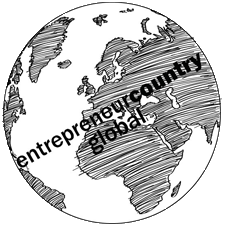Palo Alto Goes Global
I grew up near Palo Alto, so if I had a bias, it would be that Palo Alto is the epicentre of the tech world. And as ‘all things tech’ come to be understood as the driver of growth in business, like a massive snowball picking up speed down the mountain, it should be more important what’s happening in and around Palo Alto.
 And yet the world is becoming more and more flat. Entrepreneurs who change not just the world, but major industries, can come from any corner on the planet. Skype put Estonia on the map. Nathalie Kaspersky put Russia on the map. Daniel Ek – Sweden. Mark Shuttleworth South Africa. Roman Stanek who has sold to Sun, HP and now is backed by Andreessen Horowitz, the number 1 venture fund in the valley, the Czech Republic, etc. etc. etc.
And yet the world is becoming more and more flat. Entrepreneurs who change not just the world, but major industries, can come from any corner on the planet. Skype put Estonia on the map. Nathalie Kaspersky put Russia on the map. Daniel Ek – Sweden. Mark Shuttleworth South Africa. Roman Stanek who has sold to Sun, HP and now is backed by Andreessen Horowitz, the number 1 venture fund in the valley, the Czech Republic, etc. etc. etc.
But what Palo Alto does very well is to say, ‘if you aren’t a Delaware Corp, if your accounts aren’t done in US Gaap, if your angels didn’t hail from Stanford, and you don’t know where the University Café is, then we don’t think we can engage with you. It structures the unstructured data of start-ups. And the cartographers always win. Those who structure industries make all the money as they create a self-fulfilling loop. ‘I define what’s good; therefore what’s good comes to me’. As a marketer, I tip my hat to Silicon Valley.
So God help you if you are from Odessa, Doha or Cairo, and don’t land and stay at San Francisco Airport. You don’t stand a chance.
Or do you?
The world is driven by networks today, but it is also driven by the tug of rope between the incumbents in every industry and their eying up the ascendancy of the challengers. This David and Goliath struggle is always epic, and defines how broad prosperity travels through the populace. The new David’s seek to solve problems that they can perceive in society, and so mass adoption of their solutions tends to be good for most of the population. Entrepreneurs have to be inclusive in their approach or they may fail to find a market. So the essential challenge that David brings to Goliath is to open up. The winners of the last generation’s game establishes Goliath as the king pin. But there is always another round. There’s always another subversive entrepreneur who seeks to topple all of the established winners and incumbents and create a new order of things. And I’ve worked with a few of the big ones; it’s an awesome battle to witness up close.
In one vision of the future, ‘big tech’ and mostly US tech by the way takes over every industry as Amazon has taken over storage and books, Apple music and telecoms, Google advertising, and you get the picture. But there is another version of the future whereby large enterprise get wise to the game and lean in to the tech challenge. They realise that tech is no longer an industry, but a layer. And the CEO’s of those large industries embrace that layer. They crave those digital revenues whether they are radio stations, banks, telcos, retail shops, airlines or health care firms. And they suss out that the problem lies in the business model that they’ve been working to. Innovation is not about technology but economics; otherwise, we’d all be flying the Concorde – we’re not; we’re stuffed into jumbo jets.
Case in point: Kodak and Polaroid and Instagram were in the same industry. And yet they didn’t have a dialogue Instagram was organised around the consumer, and the former were working for their suppliers.
Size used to drive market power. You couldn’t be small or young, and be listened to. I’m a record label, so I’m big, and you, artist, are small. Take it or leave it. But then canny David’s decided to play a trick on those old Goliaths. They changed the rules of the game. They realised that the world had gone network. Business was no longer linear. It wasn’t that I sold, you bought, and one of us had to win, but that we were participating in a transaction with multiple parties: consumer of music, artist, distributor etc. Someone needed to organise those economics, and David stepped up to the plate.
Enter Apple which broke the hold that mobile telecoms firms’ had on the consumer. Enter Spotify who exploded a market enabling mass discovery by reducing the cost of production and distribution but also by organising the economics for the ecosystem at the heart of the music industry.
Enter Monitise whose CEO and Founder Alastair Lukies said a very basic thing at the beginning of his 10 year journey: ‘If mobile banking is going to work, it has to work for everyone – the telco, the bank, and the individual who gets a lower cost of capital’. Watch out Western Union who’ll charge you 22% if you’re poor. More than 1,000 financial institutions are now serviced by Monitise who have bought their US competitor and been backed by VISA 5 times. Monitise created the economics for the mobile banking industry; that’s why it’s experiencing the biggest J curve in UK tech industry history.
But how do you repeat the success of a Monitise over and over again. Where’s the entrepreneur factory? How do we breed in the right software in the mindset? Truth is that there have always been great entrepreneurs throughout history distributed around the world. But the infrastructure for releasing their gift is not evenly distributed around the world. And Palo Alto exerts a very firm control.
This is, however, a very British opportunity. Once upon a time, Britain took over the world. It cleverly said, ‘The language is English, and the civil service works like this, and the currency is the pound.’ They structured their universe, and the benefits came back multiplied, reinforcing their place at the centre of the world they touched. Then they opened themselves up, and released the top down control, and created a marketplace, reinforcing themselves as the center of the Anglosphere – in London.
Today’s challenge to take Palo Alto to the world is no different. The cartographers win. As Wayne Gretzky said, ‘a good hockey player plays to where the puck is, but a great one plays to where it is going.’ We must grab hold of where the world is going, and internalise that future vision in order to play our best game today.
We must open source the tools to win. Our corporates must become a legitimate highway for the digital cars who are looking for distribution. We must desire to become the industry architects and to position our companies as the operating systems of their industry.
A couple of years ago, I set up a venture capital fund. We have found great British entrepreneurs to back. But what I hadn’t fully internalised at the beginning was the game despite 25 years working in the tech industry. The ‘game’ for every European tech venture capitalist is to back a start-up and sell it to a US big tech firm. That’s it. It’s actually not creative. But I didn’t get into venture capital to sell to the Americans.
We must change the rules of the game. We must aspire to organise industries. If we genuinely know where that puck is going, then the game we play today is not a Palo Alto-centric one. It’s a game of disruptive economics with open-sourced productivity tools. The software is actually in the brains of the entrepreneurs AND the corporate CEO’s who will dominate this next decade. Whose code are you writing?
- Tags: blog, entrepreneurcountry, featured, Julie Meyer, palo alto, sweden

